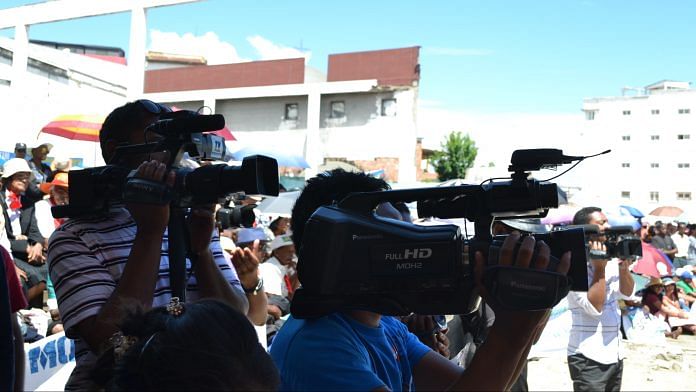
Thank you dear subscribers, we are overwhelmed with your response.
Your Turn is a unique section from ThePrint featuring points of view from its subscribers. If you are a subscriber, have a point of view, please send it to us. If not, do subscribe here: https://theprint.in/
In any healthy democracy, the parameter to ascertain its growth and development is to analyse how free and fair press/media is functioning and unfortunately for India, as per World Press Freedom Index 2021 produced by Reporters Without Borders, India has been ranked 142nd out of 180 countries.
In the backdrop of the recent death of ABP journalist Sulabh Srivastava in Pratapgarh (UP), the falling graph of journalists’ immunity against threat and violence has been exposed again, especially in Uttar Pradesh. As per Reporters Without Borders report, “India is one of the world’s most dangerous countries for journalists trying to do their job properly. They are exposed to every kind of attack, including police violence against reporters, ambushes by political activists, and reprisals instigated by criminal groups or corrupt local officials”.
Media forms the 4th pillar of democracy but the organisations protecting the rights of journalists like Press Council of India, several press clubs at district level among others have become toothless tiger wherein on every tragedy, attack or unprecedented event, “condemnation” or “action seeking report” letter is issued which merely adds to the problem.
There is a dire need to reform these organisations, coronate them with more power and accountability, in order for them not to become a mockery of the system. Although journalist Sulabh Srivastava’s death is still being investigated and police have suspected it to be an “accident”, the broader issue remains that on 13th June, Sulabh had written a letter to Additional DGP (Prayagraj) Prem Prakash seeking “protection” as he had alleged that he was being “followed” and getting “threats” due to continuous reportage on liquor mafia functioning fluently out of Pratapgarh. But Sulabh was not alone, there is a battery of reporters and editors who follow the journalism of courage’s path and have met a similar fate like Rajdeo Ranjan of Hindustan newspaper in Patna, Shujaat Bukhari of Rising Kashmir in Srinagar among others.
Journalistic Ethics & Trust Deficit in Media
A journalist by nature should be adversarial, they must question the establishment but there is a serious crisis of credibility in the news industry which we are unwilling to address because it suits us at the moment to play and pursue individual agenda rather than finding out the truth. A media which fears doesn’t deserve to be part of the democracy that we are in, but nowadays it’s more about plying to a particular line while having vested interest embedded in our conscience.
In the era of social media and post-truth society, the capacity to exaggerate is also great and the irony of Indian experience in journalism is that: people are not willing to pay for quality news and quality journalism. Today, journalists are on the defensive because today they worry if they reflect upon something, will they be called anti-national, will they be abused on social media or will they be ostracized from their newsroom; as today the bias lies in the eyes of beholder.
The media is always subjected to the charge of bias if they toe the line of political agenda which parties propagate, hence they need to overcome such prejudices and report on facts and be adversarial.
There is an organic role of journalism in transforming the society but if editors and reporters keep getting threatened, then one won’t be able to deny the assertion that “an unsaid emergency is prevailing in the country”. Any stand taken against religious bigotry in Op-Ed or any piece of satirical content today passes through a litmus test of “hurt sentiments”, hurting the creative professionals and their work. Even the judicial elucidation of Article 19 (1A-B), isn’t aloof of societal influence.
Also read: SubscriberWrites: How media ‘sabotaged’ vaccine rollout and a ‘doomed’ vaccine nationalism
These pieces are being published as they have been received – they have not been edited/fact-checked by ThePrint.

COMMENTS